Checked luggage (or baggage) leaves a lot to be desired.
There are fees that tend to pile up, the liability and worry of potentially losing your luggage, and just the extra effort it requires to bring your checked luggage along with you.
But dealing with checked luggage does not have to be a miserable experience and you don’t even have to pay for your checked baggage all the time.
In this article, I’ll break down everything you need to know about checked luggage including how to avoid the fees.
I’ll also shed light on things that you can and cannot bring along in your checked baggage.
And finally, I’ll give you some super helpful tips on how to avoid getting your luggage lost.
Table of Contents
Checked baggage fees
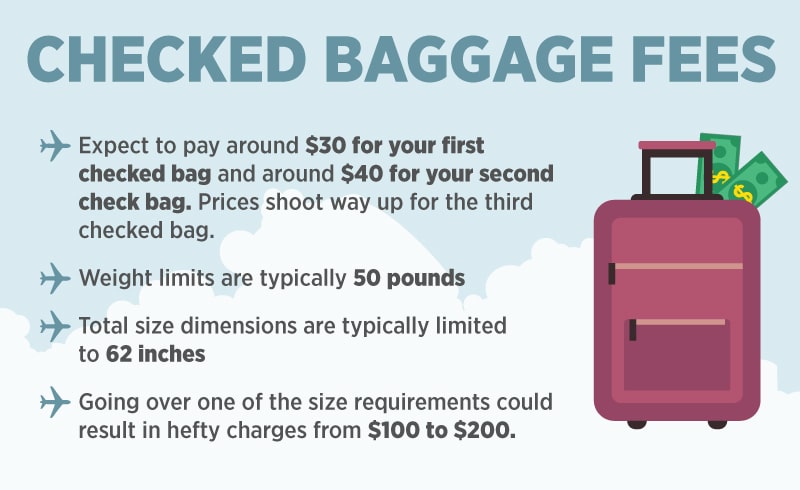
Here’s an overview of what baggage fees will likely cost you with major US airlines on a one-way trip.
| Airline | 1st | 2nd | 3rd | Size |
| Alaska | $35 | $45 | $150 | 50lbs + 62″ |
| Allegiant* | $29 | $53 | $53 | 50lbs + 80″ |
| American | $40 | $45 | $150 | 50lbs + 62″ |
| Delta | $35 | $45 | $150 | 50lbs + 62″ |
| Frontier* | $59 | $79 | $99 | 40lbs + 62″ |
| Hawaiian** | $30 | $40 | $100 | 50lbs + 62″ |
| JetBlue | $35 | $45 | $125 | 50lbs + 62″ |
| Southwest | $0 | $0 | $125 | 50lbs + 62″ |
| Spirit* | $34 | $74 | $99 | 40lbs + 62″ |
| Sun Country* | $40 | $45 | $45 | 50lbs + 62″ |
| United | $40 | $50 | $150 | 50lbs + 62″ |
- *Fees may differ based on time paid and routes
- ** Based on travel to North America
- Size requirements relate to the weight of the bag and the inches are the overall dimensions (L+W+H)
So generally you can expect to pay around $40 for your first checked bag and around $50 for your second check bag. The price usually shoots way up for the third checked bag.
In addition to the standard baggage fees, you also need to watch out for oversized and overweight baggage fees.
Typically, you are looking at weight limits of 50 pounds and total size dimensions of 62 inches.
Going over one of the size requirements could result in hefty charges from $100 to $200.
Many airlines will charge you a fee for each type of overage.
So if you have a bag that is oversized and overweight, that would result in two additional charges and that can add up really quick to $300!
Avoiding baggage fees
There are a number of ways that you can avoid baggage fees and these include:
- Co-branded airline credit cards
- Holding elite status
- Special airline memberships
- Travel/airline credits attached to credit cards
- Military status
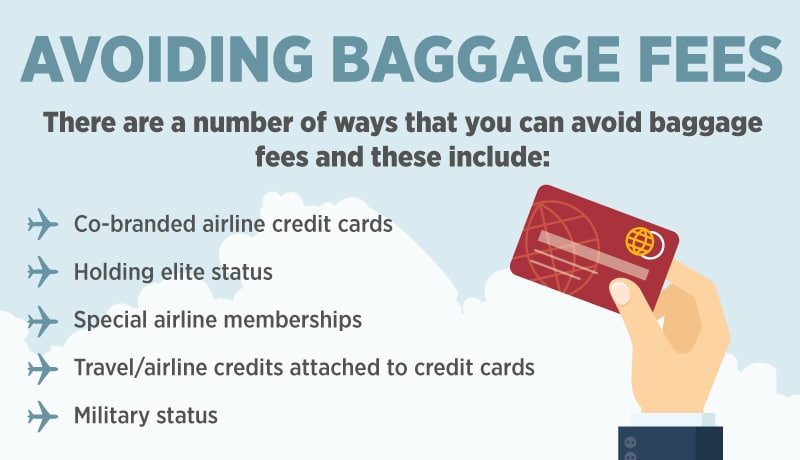
Credit cards
Co-branded airline credit cards are the easiest ways to avoid baggage fees.
You can often get a free checked bag for you and at least one companion when using a co-branded airline credit card.
Here are a couple of credit cards that offer free checked baggage:
- United Explorer Card: One free checked bag for you and a companion on international flights.
- Citi Platinum Select: One free checked bag for you and up to six companions on domestic flights.
If you go with a more premium card, you might be offered more free checked bags such as with the United Club Infinite Card, which offers two free checked bags.
Just be aware of the terms because some airlines require you to use your co-branded credit card when purchasing your airfare in order to get the benefit.
There are also different stipulations for how many companions can get free bags and whether or not the perk applies to international flights.
Elite status
Elite status is an easy way to get around paying baggage fees.
The higher up you go in airline elite status, the more bags that you can check for free and the heavier they can be.
Typically, the bottom levels will start you off with one free checked bag.
Here’s a look at what United offers its elite members when it comes to free checked bags. Notice that the weight requirement also goes up to 70 pounds.
| Premier level | Checked bags in Economy, 70 lbs. | Checked bags in premium cabin, 70 lbs. |
|---|---|---|
| Premier Silver | 1 | 3 |
| Premier Gold | 2 | 3 |
| Premier Platinum | 3 | 3 |
| Premier 1K | 3 | 3 |
Special memberships
Some airlines offer special membership programs like the $9 Fare Club by Spirit Airlines and the Alaska Airlines Club 49.
These memberships can save you on things like airfare but also sometimes you can get discounts for baggage fees.
Some airlines, like United may even offer a special baggage subscription service which can be worth it in some cases (although if you do the math you typically are better off with the credit card perks).
Credits on travel credit cards
You can utilize special travel credits that are attached to credit cards in order to get reimbursed for baggage fees.
For example, the Amex airline credits are perfect for getting reimbursed for up to $250 in airline incidental costs like baggage fees. You can find these credits on cards like the Platinum Card.
The great thing about these credits is that you can use these for different airlines. So instead of being forced to fly on a single airline to get the perk, you can choose which airline works best for you.
While the Amex airline credits are great, the most flexible option would be to get a card that has a broad travel credit such as the $300 travel credit that comes with the Chase Sapphire Reserve.
You could use that travel credit on any airline and for virtually any travel expense, including airfare.
Military members
If you are in the military, you can often get many bags checked for free for you and potentially also for your spouse. This is even the case when traveling for personal reasons.
For example, United Airlines allows you to get three free checked bags on a personal trip. Plus, these bags can way up to 70 pounds!
Be sure to check with the airlines regarding your military related benefits when it comes to checked baggage.
Items you should NOT put in your checked baggage
It’s no secret that when going through airport security, you’ll have to be extra careful about what items you bring as a carry-on.
There are special rules like the TSA liquids rules that you need to be mindful of and also heightened rules for things like sharp objects, firearms, etc.
But when you are dealing with the checked baggage, you have much more freedom to bring along different items.
You still may have some restrictions, though. And there are definitely some items better off in your carry-on and not your checked baggage.
So here are some items that you do NOT want to pack in your checked baggage.
Related: What’s a Personal Item on a Plane?
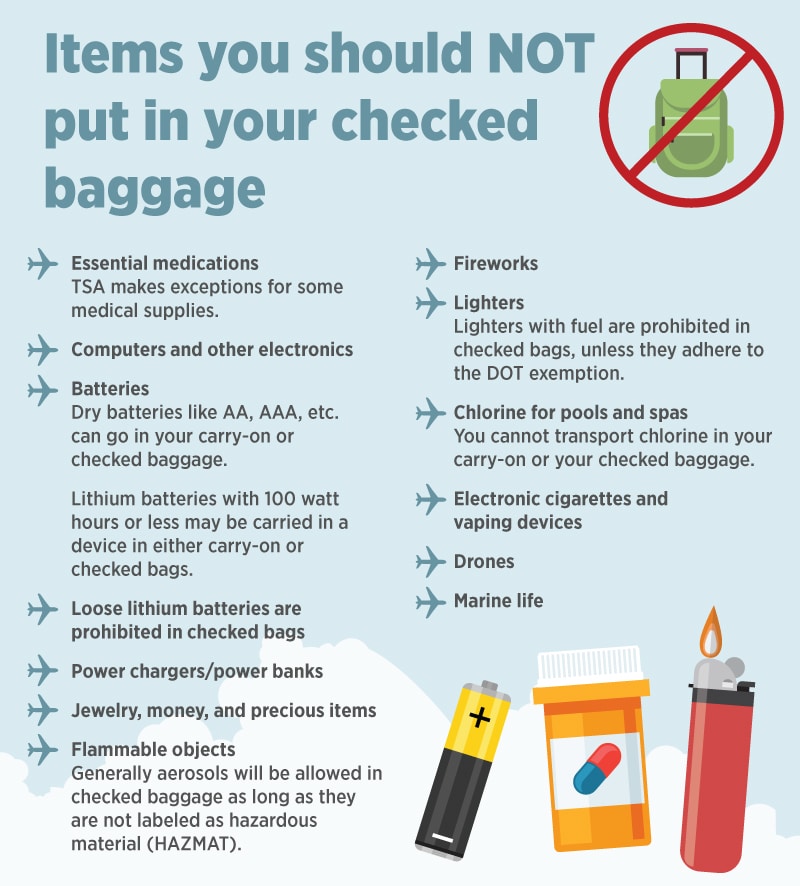
Essential medications
Even if you don’t think you will need a medication during your flight, any medication that will be essential to you during your trip should go in your carry-on.
If you think the medication is too big or will violate the TSA liquid rules, there are exceptions for medical supplies so you likely can still bring it through airport security.
Related: TSA Medication Rules for Flying on Planes
Computers and other electronics
You do not want to store your laptop or other personal electronics like tablets in your checked baggage.
The risk of them being stolen or damaged is much higher when in your checked bags.
So bring them as a carry-on and be prepared to remove your laptop and other large electronics (like full sized video game consoles) from your bag unless you have TSA Pre-Check.
Batteries
Batteries can sometimes be an issue when it comes to checked baggage.
With “dry” batteries like AA, AAA, C, and D, you don’t have anything to worry about — they can go in your carry-on or checked baggage.
But things are much different with lithium batteries.
Lithium batteries with 100 watt hours or less may be carried in a device in either carry-on or checked bags.
Loose lithium batteries are prohibited in checked bags.
Lithium batteries with more than 100 watt hours may be allowed in carry-on bags with airline approval.
One spare battery, not exceeding 300 watt hours, or two spare batteries, not exceeding 160 watt hours each, are permitted in carry-on bags.
Power chargers/power banks
Phone chargers can go in your checked baggage but portable chargers and power banks containing a lithium ion battery must be packed in your carry-on.
Jewelry, money, and precious items
Avoid packing jewelry, or any type of valuables or important documents such as passports in your checked baggage.
Do not store cash, credit cards, travelers checks, or any other type of money related object in your checked baggage.
If you inspect the airline’s contract of carriage carefully, you will see that airlines typically will exclude liability for damage or loss of valuable items like:
- Antiques, artifacts, collectibles, religious items
- Eyeglasses, Prescription Sunglasses and Non-Prescription Sunglasses
- Items made of paper (e.g., blueprints, maps, manuscripts, business/personal documents, photos, books, securities, etc.)
- Money, gift cards, and gift certificates
- Jewelry
- Irreplaceable items
Think of your checked baggage as a safe with a cardboard door that’s being moved by strangers (out of your sight) from point A to point B.
Now think about what you would feel comfortable stashing in there. Those are the type of items you should keep in your checked baggage.
Flammable objects
Be careful because some aerosols are considered flammable and so objects like bear spray are not allowed in your checked or carry-on baggage.
You are allowed to bring one 4 fl. oz. (118 ml) container of mace or pepper spray in checked baggage “provided it is equipped with a safety mechanism to prevent accidental discharge.”
Self-defense sprays containing more than 2 percent by mass of tear gas (CS or CN) are prohibited in checked baggage.
Cooking sprays are also not allowed as carry-on or checked baggage items.
Generally aerosols will be allowed in checked baggage as long as they are not labeled as hazardous material (HAZMAT).
Any type of other flammable substance such as gun powder, fuel, matches, certain paints, etc. will not be allowed on the plane.
There is an exception for matches: One book of safety (non-strike anywhere) matches are permitted as carry-on items, but all matches are prohibited in checked baggage.
Fireworks
Fireworks, fire crackers, bang snaps, party poppers, sparklers, and anything within the realm of explosive objects will not be allowed in a carry-on or a checked bag.
This includes other items like flare guns and bear bangers.
Lighters
Lighters with fuel are prohibited in checked bags, unless they adhere to the Department of Transportation exemption, which allows up to two fueled lighters if properly enclosed in a DOT approved case.
Some lighters are not allowed in your carry-on or checked bags including: Arc Lighters, Plasma Lighters, Electronic Lighters, E-Lighters.
Chlorine for pools and spas
Chlorine for pools and spas is not allowed on a plane — period. You cannot transport chlorine in your carry-on or your checked baggage.
Electronic cigarettes and vaping devices
The FAA prohibits these devices in checked bags:
- Battery-powered E-cigarettes
- Vaporizers
- Vape pens
- Atomizers
- Electronic nicotine delivery systems
However, you can bring these on as carry-on items.
Drones
TSA recommends that you check with the airline you’re flying with when it comes to the best way to transport your drone but speaking from personal experience, you are much better off carrying your drone in a hard-sided case through the airport as a carry-on.
And you should note that some of the batteries used in drones are not allowed in checked baggage.
Marine life
You are not allowed to transport some marine life like live coral and live fish in your checked baggage although they can come through in carry-ons.
An exception is that you can bring a live lobster through your checked baggage.
If you have questions about other items be sure to check out the TSA website.
Items you should put in your checked baggage
Below are items that you want to include in your checked baggage and often avoid including in your carry-on.
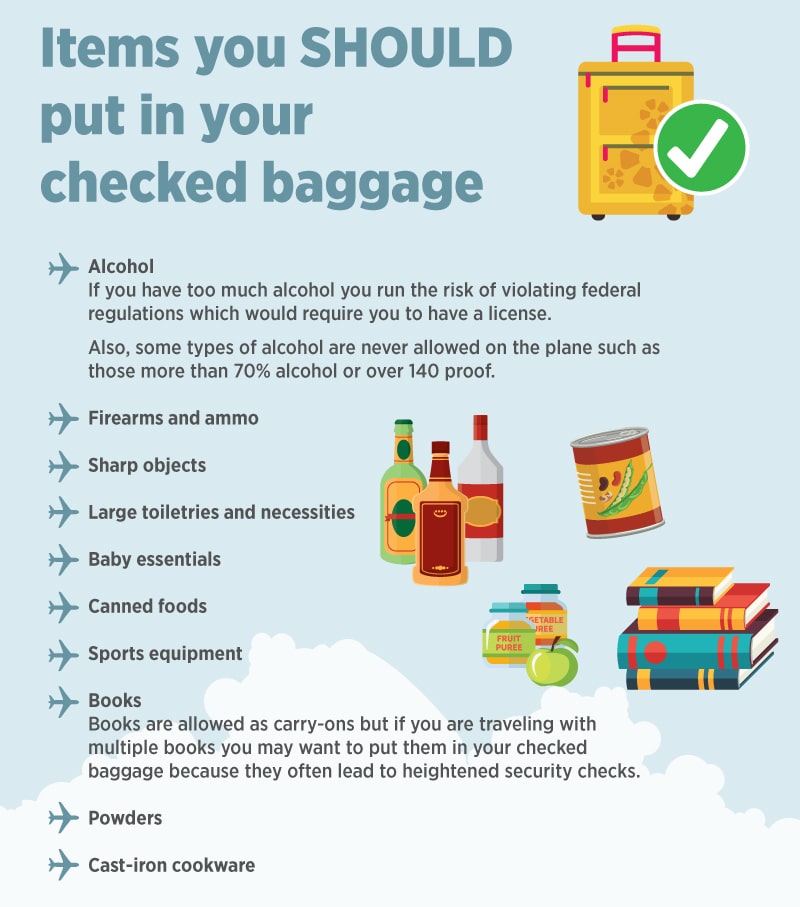
Alcohol
Due to the liquids rule, you’ll often have to pack alcohol in your checked baggage.
But be aware that when coming back into the US, if you have too much alcohol you run the risk of violating federal regulations which would require you to have a license.
Also, some types of alcohol are never allowed on the plane such as those more than 70% alcohol or over 140 proof.
Read up on all the rules for bringing alcohol on a plane here.
Firearms and ammo
You most definitely do not want to bring firearms through airport security because you could land in a lot of legal trouble.
Luckily, you can bring your firearms and ammo on a plane via checked baggage as long as you comply with certain requirements.
Sharp objects
You will need to pack most sharp objects in your checked baggage such as knives, axes, etc.
This includes other items like the blades to your blenders, certain types of razors, box cutters, ice picks, sabers, etc.
Most tools will also need to go in your checked baggage such as hammers, drills, drill bits, saws, tools longer than 7 inches, etc.
Large toiletries and necessities
On shorter trips, it’s easy to get by on the toiletries offered by the hotel or by bringing small containers that comply with the TSA liquids rule.
But on longer journeys or on special trips where you want to be as comfortable as possible, you may want to bring larger quantities of toiletries.
Baby essentials
You are allowed to bring reasonable quantities of things like baby formula and juice through airport security as a carry-on.
However, you will be limited in quantities and if you have other items like baby powder, they may need to be screened separately.
Therefore, it’s often easier to just place these items in your checked baggage if possible.
Canned foods
Canned foods can be problematic because of the TSA liquids rule and because they can make things difficult for x-ray machines sometimes. For those reasons, it’s recommended to just transport canned foods in your checked baggage.
Sports equipment
Often times sports equipment that can be used as a weapon or bludgeon will have to be transported in a checked bag.
For example, you have to place baseball bats, golf clubs, hockey sticks, lacrosse sticks, and hiking poles in your checked baggage.
Other types of sports equipment like baseballs, footballs, bowling balls, etc. can be brought in your carry-on or checked bags.
Just know that sporting equipment goods are typically excluded from liability for many airlines.
Books
Books are allowed as carry-ons but if you are traveling with multiple books you may want to put them in your checked baggage because they often lead to heightened security checks.
If you don’t want someone rummaging through your luggage, this is something to think about.
Powders
While powders can be brought through as a carry-on, they also often lead to heightened security screening.
So if you are traveling with supplement powders such as protein powder, sometimes it’s easier to just put it in your checked baggage so you can avoid the hassle of getting swabbed.
Cast-iron cookware
If you’re trying to travel with your heavy cast-iron cookware, these are not allowed to be transported in your carry-on so you must transport them in your checked baggage.
Foam toy swords
Foam toy swords cannot be brought through airport security and must be transferred in a checked bag. However, other items like Harry Potter wands and lightsabers can be brought through as a carry-on or checked bag item.
Checked baggage tips
There are a few steps you can take to ensure that if anything happens to your baggage you are taken care of. Below are some of the smartest things to do so that you don’t run into any issues with your checked luggage.
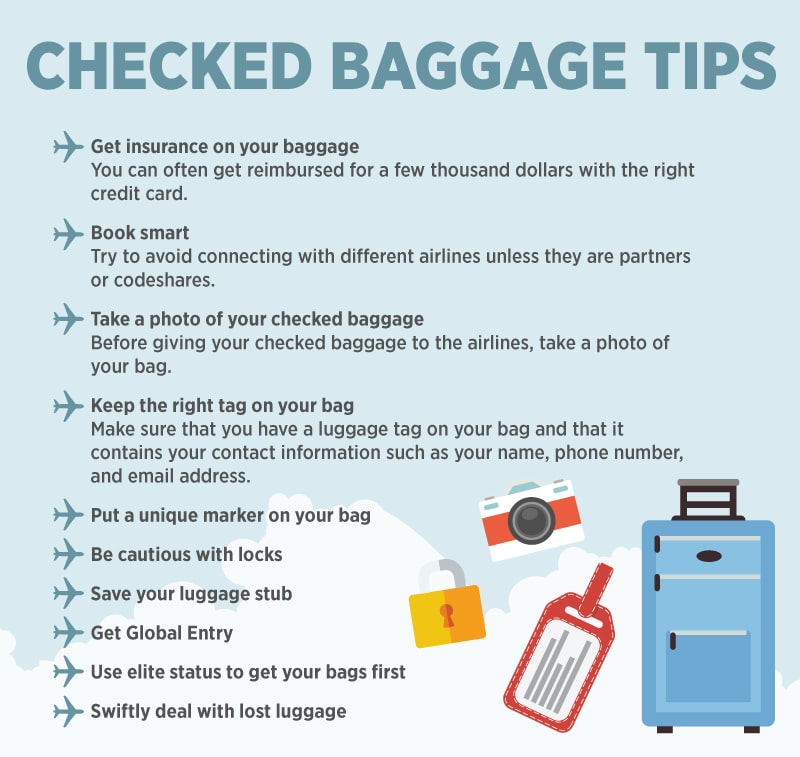
Get insurance on your baggage
Many great travel rewards credit cards now come with insurance that applies to your checked baggage.
The limits vary and sometimes you have different limits for carry-ons and checked items or based on the type of item (e.g., jewelry).
Tip: You can often get reimbursed for a few thousand dollars with the right card and the claims process will likely be more favorable than dealing with an airline, so I highly recommend using the right credit card for baggage insurance.
Book smart
Taking care of your checked baggage and preventing them from being lost starts with booking your travels smartly.
Try to avoid connecting with different airlines unless they are partners or codeshares.
This is especially the case when traveling internationally as that is the time I have had the most issues with lost luggage.
Also, be conservative when estimating the time needed to change between flights, especially if you have to go through security again.
Don’t forget, when you land in the US you will have to go through customs and then re-enter security on a connection.
Tip: Some airlines will allow you to receive your checked baggage during a connection if the connection is very long (e.g., overnight) so if you think that might be needed then let the airline know.
Related: Can you leave the airport during a layover?
Take a photo of your checked baggage
Before giving your checked baggage to the airlines, take a photo of your bag and make sure that any unique features are seen in the photo.
This will be very helpful if your bag is lost because you can send the airlines a photo of your luggage.
Keep the right tag on your bag
This one is obvious to some people but I still see plenty of bags come out that do not have any contact tags.
Make sure that you have a luggage tag on your bag and that it contains your contact information such as your name, phone number, and email address.
Many people choose to not include their home address because of security reasons.
If you don’t want to include your home address you could always include the address of the hotel you are staying at or even a work address.
If you’re staying at multiple hotels, you can list the dates and names of those hotels along with the phone number which will make things very easy for someone trying to get into contact with you.
You also want to make sure that you select the right luggage tag.
Avoid choosing a luggage tag that has the flag of your country when traveling internationally and avoid tags with political messages if you can. Both of those things can invite trouble in certain locations.
Also, try to find a luggage tag that has a flap or cover so that your information is not easily retrievable.
Put a unique marker on your bag
This tip goes along with the first and that it’s a good idea to put something on your bag that allows it to stand out.
Some people choose to just purchase a bag with a loud color such as orange that will stick out and make it easy to find the bag.
But if you want a more subdued luggage bag, consider finding a luggage tag or some other type of tag that sticks out from a distance.
Be cautious with locks
If you put a lock on your luggage and TSA wants to inspect it and they don’t have access to your bag, they will cut your lock off.
To avoid this, a lot of travelers like to use special TSA approved locks.
These are locks that the TSA has a master key for so that they can easily access and open your bag for inspections.
Locks can help discourage some thieves from getting inside your bag and also help your bag to remain closed.
However, luggage locks are not full-proof as many can be picked or your bag can simply be cut into. Locks may also make other people suspicious about the value of your belongings.
So while locks can be helpful, the best practice is to simply not include your valuable items in your checked baggage.
Save your luggage stub
After you check your luggage, you should be given a small stub that is essentially a receipt that confirms you checked a bag.
This stub can be extremely important for two reasons.
First, some airlines may ask you to show the stub when picking up your luggage. It’s rare but it can happen.
Second, as I’ll talk about below, if your luggage is lost these luggage tabs will be necessary to track down your bags.
You should be issued a separate stub for each bag so make sure that you have a unique stub for every item of checked baggage.
Get Global Entry
Global Entry allows you to get expedited entry back into the US when going through immigration.
It could often save you tons of time and stress when those immigration lines get backed up but it also can give you expedited entry through customs which is when your baggage would be inspected.
How to get your bags first
One of the perks of having airlines elite status is that you will be among the first passengers to receive your bags at the baggage claim area.
However often times these priority tags they put on your bags do not guarantee that you will be among the first — it can be very hit or miss.
Dealing with Lost luggage
There’s nothing worse than showing up in a foreign country or city and not finding your bag at the baggage claim area.
But if you travel enough, eventually your luggage will likely be delayed/lost.
The first thing to do in a situation like this is to contact an agent at the airport.
You can often find a help desk near the baggage claim area for your specific airline or for the airport in general.
Do not leave the airport until you have contacted the airline because you usually have to act quickly to get things done.
You need to let them know that you did not receive your luggage and they should file a report.
Start gathering all of your documents like your ticket stubs, boarding pass, and be sure to hold on to the form/claim papers that they give you.
Take a picture of these documents on your phone just in case you end up losing them.
Sometimes they can instantly track where your bag is and you can work out a time when your bag will be delivered.
This could be later on in the day or it could be a day or two. Sometimes they will deliver the bag to your hotel and other times you may have to travel to the airport to receive it.
It’s very handy if you used a credit card to take advantage of baggage delay in cases like this.
With baggage delay, you’ll be able to get reimbursed for toiletries and necessities including clothes while you wait for your baggage to arrive. You can often get reimbursed for up to $100 per day which is plenty to go on a little shopping excursion while you’re waiting for your bags.
Tip: If your luggage is simply delayed by a short amount of time such as 30 minutes inquire with the airline about complimentary bonus points.
Checked baggage FAQ
How much does it cost to check a bag?
Each airline has its own pricing structure but generally you can expect to pay around $40 for your first checked bag and $50 for your second checked bag.
How can I avoid baggage fees?
You can avoid baggage fees in several ways including:
- Co-branded airline credit cards
- Obtain airline elite status
- Special airline memberships
- Travel credits on credit cards
- Military memberships
What are the weight limits for checked baggage?
Typically, your checked baggage must be under 50 pounds although some airlines limit the amount to 40 pounds.
What are the size limits for checked baggage?
The most common size limit for checked baggage 62 inches for overall dimensions. To find this figure, add up the length + height + width of your luggage.
Are airlines responsible for damaged items in my luggage?
You can file a claim when an airline damages certain items in your luggage during transit. However, you should refer to the contract of carriage because many items are excluded from liability.
Should you lock your luggage bag?
Locking your luggage can prevent some thieves from stealing your items but you should use a TSA approved lock to avoid TSA agents cutting off your lock. But most importantly, you should avoid placing valuable and a replaceable items in your checked baggage.
What should I do if my luggage is lost?
If your luggage is lost you should immediately contact an agent at the airport. They should be able to help you track down your luggage. Be sure to hold onto your luggage stub, boarding pass, and any forms they give you regarding your delayed or lost luggage.
Can I put batteries in my checked baggage?
You can store dry batteries like AAA, AA in your checked baggage without any problem. However, if you are traveling with lithium batteries you may need to transport those in your carry-on.
Can I transport a gun in my checked baggage?
Yes, you can transport some guns and ammo in your checked baggage but you must comply with certain rules and restrictions.
Are checked bags sent through an x-ray machine?
Yes, your checked luggage will typically be sent through an x-ray machine at large airports. If anything raises a red flag, it will be manually inspected.
Final word
Dealing with checked baggage is not always the funnest experience but there are plenty of ways that you can avoid the pain points such as the baggage fees and stressful situations with delayed or lost luggage.
Daniel Gillaspia is the Founder of UponArriving.com and the credit card app, WalletFlo. He is a former attorney turned travel expert covering destinations along with TSA, airline, and hotel policies. Since 2014, his content has been featured in publications such as National Geographic, Smithsonian Magazine, and CNBC. Read my bio.

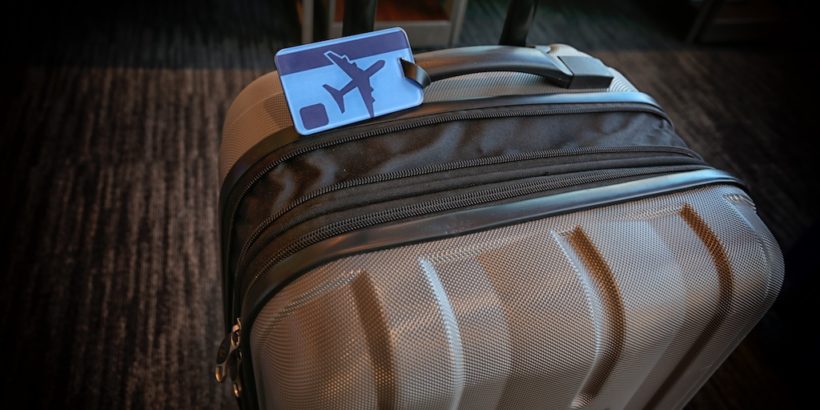
Thank you for this guide!